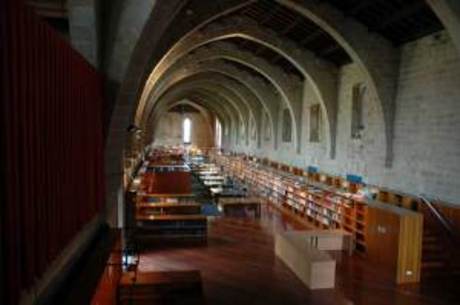Biblioteca de Catalunya
The National Library of Catalonia is a Spanish National Library located in Barcelona. The mission of the Library of Catalonia is to collect, preserve, and spread Catalonian bibliographic production and that related to the Catalonian linguistic area, to look after its conservation, and to spread its bibliographic heritage while maintaining the status of a universal center for research and consultation. It currently occupies 8,820 m² and has about three million items.
The Library was founded in 1907 as the library of the Institut d'Estudis Catalans. It was opened to the public in 1914, in the time of the Mancomunitat de Catalunya, and was housed in the Palau de la Generalitat de Catalunya.
In 1914 the Mancomunitat de Catalunya converted the library of the IEC into a public cultural service. In its early days, the library was situated in an area of the Palau de la Generalitat in Barcelona. In 1929, the Library was acquired by the city government of Barcelona. In 1931, the 15th century buildings formerly occupied by the Hospital de Santa Creu were declared a part of Spain's historical patrimony; and the municipality of Barcelona approved the cession of large portion of the site to the Biblioteca de Catalunya.
In 1936 the first reading room, the Sala Cervantina was opened, but the project was halted because of the Civil War and not all of the necessary adaptations were completed. After the fall of Barcelona in early 1939, the library was closed until 1940. After the Spanish Civil War, in 1940, the library was renamed the Central Library by the Franco regime and moved to its new site where it remains to this day. During the rule of Franco, the institution was turned into a general use library, which was intended to supplement the deficiencies of the public and university libraries.
In 1981 it was made the national library of Catalonia by the Llei de biblioteques ('Libraries law') of 1981, approved by the Parliament of Catalonia, conferring upon it the duties of the reception, conservation, and distribution of the Catalan legal deposit. In 1993, the Law of the Library System of Catalonia extended the institution's depository functions and helped in its modernization, which included the remodelling of the building, its own functional reorganization and the digitization of its procedures.
During the 1990s, a major renovation project further transformed the library, including the construction of four underground levels of storage (creating more than 40 kilometres of shelf-space) and the annex building. In 1998, the Library renovated the Gothic elements of its buildings and extended its space, thanks to the construction of a new services building.
In 2007, the Biblioteca de Catalunya and four more Catalan libraries agreed to join the digitization project. These libraries have begun digitizing books of theirs that are in the public domain. The digitization partnership project is intended to make these books available on the Internet. The Biblioteca de Catalunya acts as coordinator and intermediary on behalf of the other four Catalan libraries participating in the project: the library of the Monastery of Montserrat, the Public Episcopal Library of the Seminary of Barcelona, the Library of the Barcelona Excursionist Centre and the Library of the Barcelona Athenaeum. The Catalan libraries group became the second non-Anglo-Saxon collaborator to join the Google Books Library Project, within the Google Book Search program. In 1977, the National Library of Catalonia joined another Spanish participant in the project, the Complutense University of Madrid.
The Biblioteca de Catalunya has taken a mission to preserve, collect and spread bibliographic production of Catalonia and also the ones that are related to the linguistic area of the Catalunya, to take care of its preservation. In the mission it has included the spreading of the heritage of bibliography when maintaining the position a worldwide seat for the consultation and research.
The Library in Barcelona, having seen many changes for a century, is now being appreciated for its great works and now going global. Now it is a challenging time for the libraries, with the electronic communication that is causing great threat to the traditional system of shelf stored books. Biblioteca de Catalunya has responded well to this challenge and is digitalizing the ‘out of copyright books'. A visit to the National Library of the Catalonia is surely a need for the ones who really want to know the true history of the city, heritage, culture and the people there.
So if you are interested in the Catalonian language, then this is a great place to visit. However, whether or not you want to look at the books, it is well worth finding a discount hotel by the national Library of Catalonia in Barcelona, as it is a fantastic building to see and it has a great culture to absorb. You can get there via direct flight to Barcelona or to Girona, Reus or Lleida–Alguaire.
Not many people think of a library when they think of travel and sightseeing in sunny Barcelona, although the National Library of Catalonia is a place where man can learn lots of things about Barcelona, Catalonia and Spain in general.



